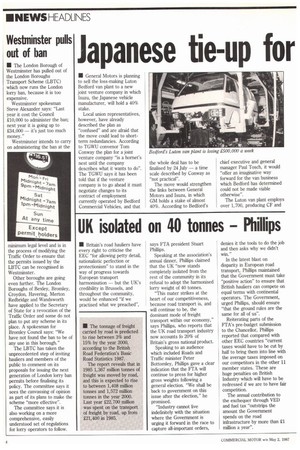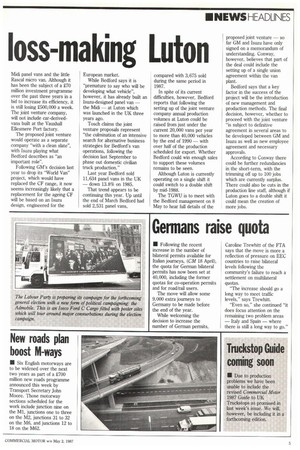Japanese tie-up for loss-making Luton
Page 6

Page 7

If you've noticed an error in this article please click here to report it so we can fix it.
• General Motors is planning to sell the loss-making Luton Bedford van plant to a new joint venture company in which Isuzu, the Japanese vehicle manufacturer, will hold a 40% stake.
Local union representatives, however, have already described the plan as "confused" and are afraid that the move could lead to shortterm redundancies. According to TGWU convenor Tom Conway the plan for a joint venture company "is a hornet's nest until the company describes what it wants to do". The TGWU says it has been told that if the venture company is to go ahead it must negotiate changes to its contract of employment currently operated by Bedford Commercial Vehicles, and that the whole deal has to be finalised by 24 July — a time scale described by Conway as "not practical".
The move would strengthen the links between General Motors and Isuzu, in which GM holds a stake of almost 40%. According to Bedford's chief executive and general manager Paul Tosch, it would "offer an imaginative way forward for the van business which Bedford has determined could not be made viable otherwise".
The Luton van plant employs over 1,700, producing CF and
Midi panel vans and the little Rascal micro van. Although it has been the subject of a i'70 million investment programme over the past three years in a bid to increase its efficiency, it is still losing 2500,000 a week. The joint venture company, will not include car-derivedvans built at the Vauxhall Ellesmere Port factory.
The proposed joint venture would operate as a separate company "with a clean slate", with Isuzu playing what Bedford describes as "an important role".
Following GM's decision last year to drop its "World Van" project, which would have replaced the CF range, it now seems increasingly likely that a replacement for the ageing CF will be based on an Isuzu design, engineered for the European market.
While Bedford says it is "premature to say who will be developing what vehicle", however, it has already built an Isuzu-designed panel van — the Midi — at Luton which was launched in the UK three years ago.
Tosch claims the joint venture proposals represent "the culmination of an intensive search for alternative business strategies for Bedford's van operations, following the decision last September to phase out domestic civilian truck production."
Last year Bedford sold 11,634 panel vans in the UK — down 13.8% on 1985.
That trend appears to be continuing this year. Up until the end of March Bedford had sold 2,531 panel vans, compared with 3,675 sold during the same period in 1987.
In spite of its current difficulties, however, Bedford reports that following the setting up of the joint venture company annual production volumes at Luton could be raised from just under the current 20,000 vans per year to more than 40,000 vehicles by the end of 1990 — with over half of the production scheduled for export. Whether Bedford could win enough sales to support these volumes remains to be seen.
Although Luton is currently operating on a single shift it could switch to a double shift by mid-1988.
The TGWU is to meet with the Bedford management on 8 May to hear full details of the proposed joint venture — so far GM and Isuzu have only signed on a memorandum of understanding. Conway, however, believes that part of the deal could include the setting up of a single union agreement within the van plant.
Bedford says that a key factor in the success of the project will be the introduction of new management and production methods. The final decision, however, whether to proceed with the joint venture "is subject to definitive agreement in several areas to be developed between GM and Isuzu as well as new employee agreement and necessary approvals.
According to Conway there could be further redundancies in the short-term, with the trimming off up to 100 jobs which are currently surplus. There could also be cuts in the production line staff, although if Luton goes to a double shift it could mean the creation of more jobs.




























































































































